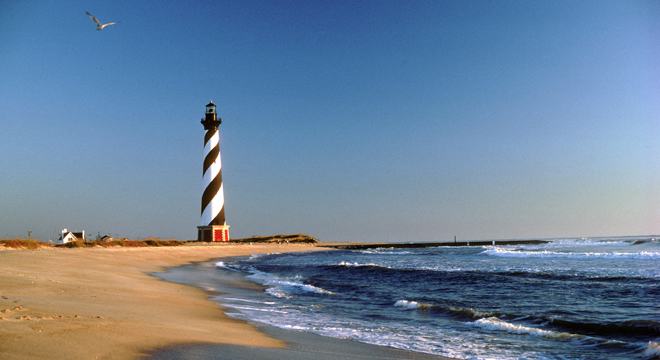Republican lawmakers in North Carolina are circulating a bill which would limit their state agencies’ ability to calculate sea-rise levels, a proposal that one member of the state’s Coastal Resources Commission science panel has termed “bad science.”
The bill has not yet been introduced, but the language in the version being circulated would make the Division of Coastal Management the only state agency allowed to produce sea-level rise rates, and only at the request of the Coastal Resources Commission, and then only under the following conditions:
These rates shall only be determined using historical data, and these data shall be limited to the time period following the year 1900. Rates of sea-level rise may be extrapolated linearly to estimate future rates of rise but shall not include scenarios of accelerated rates of sea-level rise.
In other words, instead of taking into account global warming to predict higher seas, as expected by most scientists, the bill would have the state rely only on the historical record.
Rob Young, a geology professor at Western Carolina University and a member of the CRC’s science panel, told the North Carolina Coastal Federation (NCCF), an environmental advocacy group, that the bill runs counter to the findings of the National Academy of Sciences and “every major science organization on the globe.”
“I think the Senate is within its rights to develop a sea-level rise policy,” Young said, earlier this month. “What I don’t like about the bill is the science.”
Young pointed out that other states are planning on a sea-level rise of at least three feet.
According to the NCCF, the CRC’s science panel drafted a report in 2010 that advised the state to prepare for a sea-level rise of up to 55 inches by 2100. The report said that a 39-inch rise was likely. Those findings were disputed by NC-20, an advocacy group that represents businesses and coastal counties. NCCF reports that, using the standard of the proposed bill, the state would be anticipating a 12-inch rise in sea level by 2100.
The Charlotte Observer reported this week that while the CRC’s panel confirmed its findings just last month, NC-20 appears to be “winning” the argument:
The Coastal Resources Commission agreed to delete references to planning benchmarks – such as the 1-meter prediction – and new development standards for areas likely to be inundated.
The N.C. Division of Emergency Management, which is using a $5 million federal grant to analyze the impact of rising water, lowered its worst-case scenario from 1 meter to 15 inches by 2100.
Several local governments on the coast have passed resolutions against sea-level rise policies.
NC-20 Chairman Tom Thompson told the paper that he and members of his organization believe that scientists are wrong about climate change, and that sea-level rises are part of natural cycles. He said historical figures should be used until acceleration is actually detected.
“If you’re wrong and you start planning today at 39 inches, you could lose millions of dollars in development and 2,000 square miles would be condemned as a flood zone,” Thompson said. “Is it really a risk to wait five years and see?”
State officials told the Observer the land “below the 1-meter elevation would not be zoned as a flood zone and off-limits to development.” State legislative officials, meanwhile, said they cannot predict how the proposed bill might be changed, or even when it will be introduced.
(h/t Scientific American)






